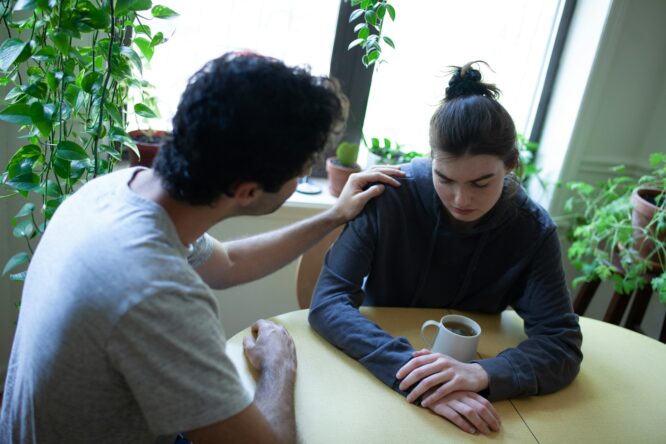Betrayal stings in a way few other things do.

Whether it’s a friend who broke your trust, a partner who wasn’t loyal, or a family member who let you down, it can really mess you up in ways that feel impossible to heal from. No matter how strong someone is, betrayal shakes them at their core and triggers a range of emotions and reactions—some immediate, others surfacing long after the damage is done.
How someone reacts after being betrayed isn’t always straightforward. Sometimes, their response may seem unexpected, even irrational, but it always means something deeper is going on beneath the surface. Here are just some of the ways they might react to what they’ve been through, and what these behaviours really mean.
1. They completely shut down.

For some people, betrayal is so overwhelming that they emotionally shut down. They stop talking about it, withdraw from everyone, and seem distant. It’s not that they don’t care; it’s that they’re protecting themselves from further hurt.
Their reaction often means they’re struggling to process what happened and need time to make sense of it. It can also be a sign that they’ve been betrayed before and have learned that shutting down feels safer than confronting the pain.
2. They act like it doesn’t bother them.

Sometimes, a person will brush off betrayal as if it’s no big deal. They might laugh it off, say they “saw it coming,” or act like they never cared in the first place. However, just because they don’t show their pain doesn’t mean they’re not feeling it.
Downplaying betrayal is often a defence mechanism. It can mean they don’t want to seem vulnerable, or they’re afraid that acknowledging the pain will make it feel even worse. Deep down, they might be hurting more than they let on.
3. They become unusually angry.

Anger is a common reaction to betrayal, and sometimes, it comes out in unexpected ways. They might lash out at the person who hurt them, take it out on other people, or feel constantly irritated over small things. That kind of reaction usually means they feel deeply hurt but don’t know how else to express it. Anger can be easier to lean into than sadness, especially for someone who struggles with vulnerability.
4. They cut the person off completely.

Some people respond to betrayal by immediately removing the person from their life. No explanations, no second chances—just a clean break. It might seem harsh, but for them, it’s the only way to regain control. Of course, that often comes from a place of self-respect. It means they’re protecting their peace and refusing to allow someone who hurt them to have access to their life anymore.
5. They try to get revenge.

For some, the betrayal is so painful that they feel the need to get even. They might expose the person’s lies, sabotage their reputation, or try to make them feel the same pain they caused.
Trying to get revenge usually means they feel powerless and want to regain a sense of control. It’s a way of saying, “You don’t get to walk away from this without consequences.” Unfortunately, revenge rarely brings true closure—it just prolongs the hurt.
6. They overanalyse everything.

After betrayal, some people replay every conversation and event, looking for signs they missed. They wonder how they didn’t see it coming or if they somehow caused it to happen.
That reaction often means they’re trying to regain a sense of security. If they can figure out why it happened, they feel like they can prevent it from happening again. Of course, sometimes, overanalysing keeps them stuck in the pain instead of moving forward.
7. They become distrustful of everyone.

Betrayal doesn’t just affect how someone sees the person who hurt them—it can change how they see people in general. They might start questioning everyone’s motives, expecting dishonesty, or assuming they’ll get hurt again.
That often means they’re afraid of being vulnerable and don’t want to risk going through the same pain again. It’s a form of self-protection, but it can also make it harder for them to form new connections and trust the people who genuinely care about them.
8. They try to pretend everything is fine.

Some people deal with betrayal by forcing themselves to move on quickly, pretending like it didn’t affect them. They might throw themselves into work, social events, or new relationships to distract themselves from the pain.
While staying busy can help in the short term, this reaction often means they’re avoiding dealing with their emotions. Ignoring the pain doesn’t make it go away—it just pushes it down until it resurfaces later.
9. They blame themselves.

It’s not uncommon for someone who’s been betrayed to turn the blame inward. They might wonder if they weren’t good enough, if they should have seen it coming, or if they somehow caused the betrayal.
That usually comes from a place of low self-worth or a history of being let down. When someone blames themselves for another person’s actions, it often means they’ve been conditioned to believe they’re responsible for other people’s behaviour.
10. They become emotionally numb.

Some betrayals hurt so much that the brain shuts down emotional responses as a way of coping. Someone who once felt deeply might suddenly feel nothing at all—no anger, no sadness, just numbness.
It often happens when the betrayal is overwhelming and too painful to process all at once. It’s the mind’s way of saying, “This is too much for me right now.” However, in the long run, if they don’t allow themselves to feel, that numbness can turn into emotional detachment.
11. They question everything about the relationship.

When someone is betrayed, they often start looking back and wondering if anything was ever real. They question whether the love, trust, or connection they shared was genuine, or if they were being deceived the entire time. Their reaction means they’re struggling to reconcile the past with the reality of what happened. It’s an attempt to make sense of something that feels completely senseless.
12. They need time alone.

After betrayal, some people withdraw completely. They need space to process their emotions without outside opinions or pressure to move on before they’re ready. That doesn’t necessarily mean they’re pushing people away forever—it just means they need time to heal in their own way. Some wounds can’t be rushed, and healing from betrayal is one of them.
13. They let it change them, for better or worse.

For some, betrayal becomes a defining moment. It either makes them more guarded and distrustful, or it makes them stronger and more aware of what they deserve. Whether it leads to personal growth or more emotional walls depends on how they choose to process it. The pain of betrayal is unavoidable, but what they do with that pain is what truly matters.
14. They eventually find peace, but in their own time.

Healing from betrayal isn’t linear. Some days, they’ll feel like they’ve moved on, and other days, the pain will hit like it just happened. After a while, though, most people come to terms with it in their own way.
Finding peace doesn’t always mean forgiving or forgetting. Sometimes, it just means accepting what happened, learning from it, and moving forward in a way that protects their heart while keeping it open to better things ahead.




